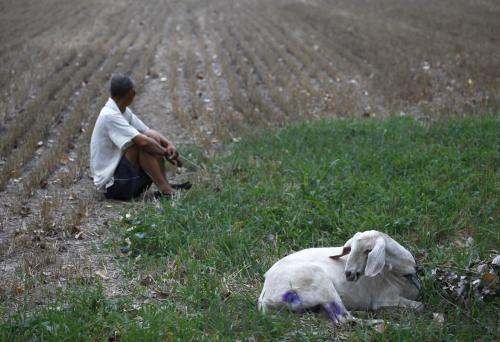|
 |
|
THIRSTY LAND: A farmer in Henan Province sits beside farmland that cannot be sown with crop seeds due to a shortage of water on July 23. Persistent drought in north China's Inner Mongolia Autonomous Region and central China's Henan Province has scorched rivers and reservoirs, causing power and water shut-offs and drinking water shortages. Some 150,000 hectares of farmland and 16.4 million hectares of pastures have been affected in the worst drought to hit the area in three years. About 1.34 million heads of cattle also lack drinking water and the drought has caused direct economic losses of 229 million yuan ($37 million). (HE WUCHANG) |
IP Protection
China's State Intellectual Property Office (SIPO) on July 29 announced that it has issued a guideline to boost intellectual property protection.
The guideline on deepening implementation of the state intellectual property strategy and strengthening and improving management on intellectual property lays out the road to set up an efficient administrative management system on intellectual property by 2020.
It requires stepping up law enforcement to safeguard market order. Service innovations are encouraged to provide better intellectual property services to the public.
The guideline was jointly issued by the SIPO and seven other organizations, including the Ministry of Education, the Ministry of Science and Technology and the Ministry of Industry and Information Technology.
No GM Rice
Chinese authorities have vowed to take a zero-tolerance stance on the illegal selling and growing of genetically modified (GM) crops days after the media exposure of GM rice on sale at a supermarket in central China.
"The ministry will punish any companies or individuals who illegally grow or sell GM grains," said a statement sent to Xinhua News Agency on July 29 by the office in charge of GM food safety with the Ministry of Agriculture (MOA).
The ministry has ordered all provincial agricultural authorities to strengthen oversight and fight illegal production and sale of seeds for GM crops, according to the statement.
Chen Xiaohua, Vice Minister of the MOA, said earlier this year that China would continue to take an "active and cautious" policy toward GM crops and had set no timetable on the commercial production of GM products.
Official Auditing
Chinese authorities will focus on environmental protection, science and technology innovation and improvement of people's livelihood when evaluating the performance of officials, a circular published on July 27 said.
According to the document, which was jointly issued by the country's auditing, state-owned asset, and human resources and social security authorities and the Communist Party of China's disciplinary inspection and organization departments, economic responsibility audits of Chinese officials will put the quality and sustainability of economic and social development under the spotlight.
It will also focus on the social, economic and environmental benefits of officials' decision-making and administrative activities, it said.
The audit, first launched in 1999 in China, covers government and Party officials and legal representatives of state-owned enterprises. The results of the auditing will be used as references in performance evaluation, promotion, and the rewarding and punishment of officials.
 |
|
LAKE EXPANSION: The area of Qinghai Lake, China's largest salt lake located in Qinghai Province, has expanded by 124 square km in the past four years, according to the latest survey. The area of the lake was 4,373 square km during the dry season in a satellite survey carried out between the end of May and early June. The lake is approaching its record size of 4477.53 square km recorded in 1974. Since 2005, It has fluctuated in size but kept increasing. (WANG BO) |
University Transparency
The Ministry of Education (MOE) on July 29 released a circular calling for timely information disclosure following a series of scandals in college admissions and other areas.
The circular designated 50 areas where 75 MOE-affiliated universities must give transparent information to the public, such as admission of recommended candidates for college admission, public bidding for infrastructure construction and university leaders' off-campus posts.
All the universities affiliated to the MOE are required to post the specified information on university websites within 20 days of any event taking place.
The circular comes after a series of scandals, including bribe-taking in college admissions, that have made the public doubt the ethics of higher-education institutions.
Hukou Reform
China plans to help an estimated 100 million people without urban ID records settle in towns and cities by 2020, the State Council, China's cabinet, said on July 30.
It issued a circular aimed at accelerating reform of the nation's household registration, or hukou system.
The document said the government will remove the limits on hukou registration in townships and small cities, relax restrictions in medium-sized cities, and set qualifications for registration in big cities.
At a press conference on that day, Vice Public Security Minister Huang Ming said differentiated approaches will be applied in the hukou system, based on the size and population of a city.
Medium-sized cities with a population between 1 million-3 million will have a low threshold, while megacities with more than 5 million residents will try to strictly control the influx of new citizens.
People wishing to settle in megacities like Beijing and Shanghai will have to qualify through a "points system" based on their seniority in employment, their accommodation and social security, according to Huang.
Court Defaulters
More than 20 percent of people who had defaulted on court fines fulfilled their obligations after punitive measures were introduced, according to the Supreme People's Court (SPC) on July 25.
Defaulters have faced travel, financial and employment restrictions after an online database that debuted last October enabled the public to check their names, according to an SPC statement released after a national meeting on court orders held in southeast China's Fujian Province.
Defaulters will be banned from flying and traveling in upper-class sleeper train compartments as well as from taking positions as legal representatives, board members, board of supervisors members and senior executives of a company.
SPC figures showed that 203,000 defaulters were submitted to the list by courts across the country by July 23, and the online database has been visited more than 10 million times since it was launched on October 24.
The database is currently shared with more than 20 financial institutions, including state-owned banks, so they can punish parties in lawsuits who fail to pay damages by freezing bank account funds or declining loan or credit card requests. | 